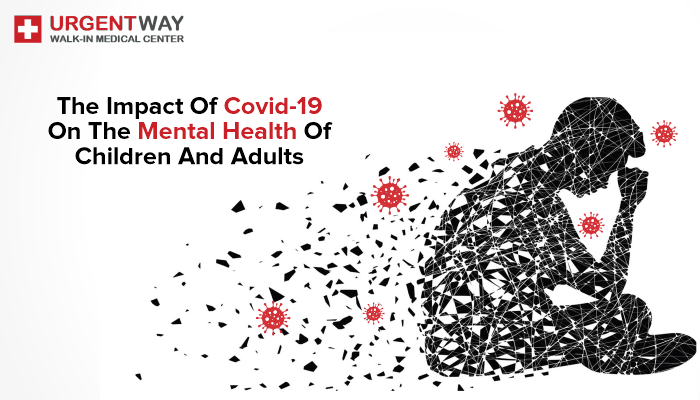Since March 2020, the COVID-19 pandemic has imposed tighter restrictions on the livelihood of children and adults, and it hasn’t come without its consequences for mental health. Many American adults have had to adjust to working from home, or worse, have lost their jobs, facing even more tough circumstances as they figure out a new means of living.
Children are also trying to accommodate new school and extracurricular activity routines to their new reality, not being able to see their friends as often, and constantly being aware of the threat of the virus. Even though vaccinations have allowed many of us to get back on track, previous impacts still linger. We are left with an important question to consider: How has COVID-19 disrupted the mental health of children and adults in the US?
COVID-19 has caused stress, fear, and worry to permeate the minds of adults and children alike. The threat of losing jobs, and loved ones, or contracting the virus themselves is a daily mental battle, and the actual experience of these situations can be debilitating.
According to a previous analysis completed by the Kaiser Family Foundation (KFF), there is a strong correlation between the economic downturn and the rising prevalence of mental health issues in Americans, especially those who have lost childcare, are working from home, are facing school closures, and even those who are required to go into work throughout the pandemic. Of all Americans, mothers and younger people have been hit the hardest.
How have older and younger adults experienced mental health impacts from COVID-19?
March 2021 KFF COVID-19 Vaccine Monitor Report:
- From March 2020 to July 2021, the share of American adults who said worry and stress related to the coronavirus was having a negative impact on their mental health increased from about 32% to 53%.
- 47% of adults continue to report negative mental health impacts related to worry or stress from the pandemic.
- Younger adults and women, including mothers with children under 18 years old in their households, are among the most likely to report that stress and worry related to coronavirus have had a negative impact on their mental health.
- 49% of Black adults, 48% of White adults, and 43% of Hispanic adults say the coronavirus has had a negative impact on their mental health
- 31% of Black adults, 23% of White adults, and 25% of Hispanic adults say it has had a “major impact”.
- Men, older adults, and Black adults may be less likely to report mental health difficulties and more likely to face challenges accessing mental health care.
- Some groups of men and women 65 and older, including men with children, have reported negative mental health impacts.
- 55% of women report a negative impact on their mental health related to the coronavirus pandemic, compared to about 38% of men who report the same.
- 69% of women ages 18 to 29 report a negative impact on their mental health.
How have children experienced mental health impacts from COVID-19?
In children, the pandemic has been shown to have greater negative effects that may carry long-term into their development. Lockdown has impeded on child emotional and social development, whereas adults face generalized anxiety and depression.
In August 2020, a team of researchers surveyed a collection of studies related to mental health and COVID-19 to amalgamate key findings in children:
- Younger children (3-6 years old) were more likely to manifest symptoms of clinginess and the fear of family members being infected than older children (6-18 years old).
- Older children were more likely to experience inattention and were persistently inquiring about COVID-19.
- Increased irritability, inattention, and clinging behavior were revealed by all children irrespective of their age groups.
- Children felt uncertain, fearful, and isolated, and they experienced disturbed sleep, nightmares, poor appetite, agitation, inattention, and separation-related anxiety.
- Older adolescents and youth are anxious regarding the cancellation of examinations, exchange programs, and academic events
- Children with special needs may have faced speech therapy and occupational therapy sessions which have a negative impact on their skills development and in turn cause distress for both the child and their parents
How has experience with coronavirus-related deaths impacted the mental health of Americans?
For many Americans, there has been a direct experience with COVID-19, with many losing loved ones close to them. The 2021 KFF report has shown more distress in those facing direct experiences with COVID-19-related deaths than groups who have less direct connections to people dying, or no connection at all.
- 24% of adults report having a close friend or family member who has died of complications related to COVID-19.
- An additional 12% say they have someone less directly connected to them who has died
- 63% of adults say they do not know anyone who has died of COVID-19.
- Of those with close connections to COVID-19-related deaths, 30% say stress related to coronavirus has had a “major impact” on their mental health.
- Groups who had less direct connections, or no personal experience with coronavirus-related death, have reported less major impact (23%), and more minor impact (53%).
How many adults are actually accessing mental health care for themselves and their children?
In the same 2021 KFF report, adults who have reported worsened mental health have also reported refraining from professional treatment.
- 32% of those who reported a negative impact on their mental health say there was a time in the past year when they thought they might need mental health services or medication but did not get them.
- 46% of mothers who report a negative mental health impact due to the pandemic say they did not get the mental health care that they needed for themselves or their children.
- 24% of adults who did not get mental health care say the main reason why was because they could not find a provider or could not afford the cost.
- 18% say they were too busy or could not get the time off work to receive treatment.
- 10% say they had problems with the insurance covering their treatment.
- 5% said they were afraid or embarrassed to seek treatment.
How can we improve mental health as the world starts to open back up?
As vaccinations continue to roll out, mental health effects from what has now been over a year’s battle will not magically dissipate. If anything, the pandemic has highlighted a need for treating mental health care just as important as one’s physical health, and not resort to therapy only in times of great distress or need.
A major obstacle is now going to be getting the necessary access to mental health care, since many Americans are facing job and insurance loss, even for their children. Children are especially sensitive at this time as they face major obstacles to their own development and education. As the world returns to normal, many Americans certainly will have difficulty catching up.


